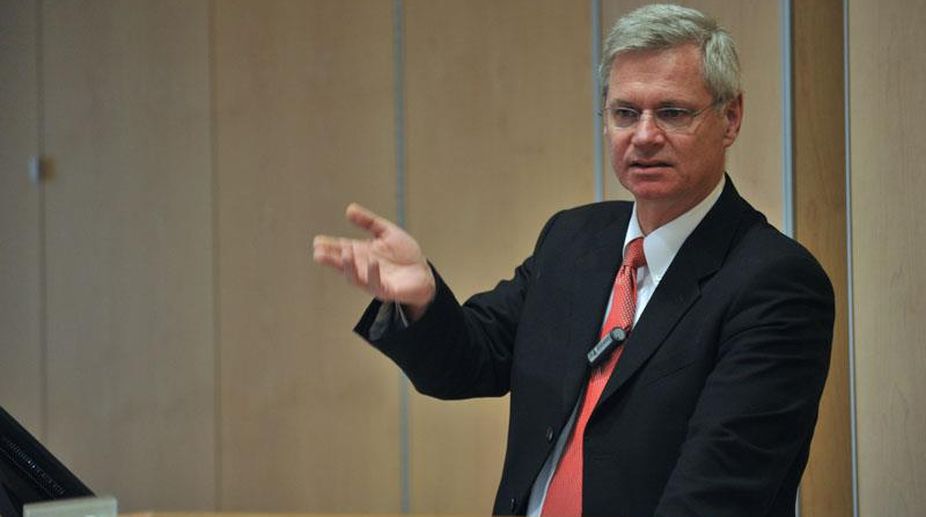Peter Taksøe-Jensen is the Ambassador of Denmark to India, Bhutan, Maldives and Sri Lanka.His previous assignment has been as the Ambassador of Denmark to the United States,2010- 15.Besides this, Ambassador Taksøe-Jensen has also held the positions of Head of Section, Department for Legal Service, Ministry of Foreign Affairs of Denmark, Head of Section, Permanent Representation of Denmark to the European Union, Brussels and Head of Section,Ministry of Foreign Affairs of Denmark.He has also served as the Chairman of the Danish Governments Commission on the Red Cross and even as a Lecturer, at numerous courses, on EU Law, EU Policies and negotiations, and on EU procedures and techniques. In this interview with The Statesman, he says that the world needs a strong Indian footprint in international institutions.
Excerpts:
Advertisement
How do you look at India-Denmark political relations?
India and Denmark have enjoyed close bilateral relations since the establishment of diplomatic ties in 1949. The relationship is based on shared interests in the political, economic, academic and cultural fields and a number of high-level visits since Prime Minister Nehru’s visit to Denmark in 1957. Today, we work with India in a number of different sectors of mutual interest and continue to expand and deepen the collaboration.
India has been seeking from Denmark the extradition of Kim Davy, prime accused in the Purulia arms dropping case. India had, in fact, scaled down diplomatic ties with Denmark, in 2012, over this issue. Has it not become a constant irritant in bilateral ties? Why is Denmark not ready to extradite Kim Davy to India to stand trial in the case?
The competent Danish and Indian legal authorities are handling the issue of a possible extradition of Kim Davy on the basis of a request from the Indian government.
How do you look at India’s role in global affairs, given the size of the country and its population?
India is a global power and a country where Danish companies need to increase their presence, not just because of the size of the domestic market, but also because of India’s increasing integration in global value chains.
Politically, the world needs a strong Indian footprint in international institutions and ambitious Indian policies on, for, example renewable energy, resource management and skill development to move us all in the direction of a better tomorrow.
How can Denmark facilitate India’s entry into the Nuclear Suppliers’ Group (NSG)?
Denmark has long been a vocal supporter of India’s membership of NSG. We believe that the NSG would be stronger with India as a member and that India has demonstrated its commitment to the NSG and the anti-proliferation agenda.
Do you support India’s candidature for a permanent seat on the UN Security Council?
Yes, Denmark supports India’s candidature for a permanent seat in the Security Council. As a small country, we have a keen interest in a strong rulesbased international architecture and we believe India shares this priority.
Does Denmark favour a Free Trade Agreement between India and the European Union (EU) and why has it taken the two sides so long to sign the accord?
Yes, as a small and open economy depending on global trade, we would like to see an ambitious free trade and investment agreement between India and the EU. With the Lisbon Treaty coming into force in 2009, the mandate to negotiate Free Trade Agreements has been delegated to the EU commission in Brussels and the EU member states are not directly involved.
Why have the two countries failed to exploit the full potential of their economic relationship?
Trade and investments between India and Denmark have improved significantly in recent years. Danish imports from India have increased by 80 per cent between 2005 and 2015, while Danish exports to India have increased by 50 per cent within the same period of time.
Within that same timeframe, Danish investments in India have increased from approximately $10 billion to approximately $62 billion.
We currently have a total of 119 Danish subsidiaries established in India, but there is potential for more.
The establishment of a direct route between Copenhagen and New Delhi will support the realisation of that potential.
Are there any high-level exchanges between the two countries in the offing?
We have had three Danish ministers visit India in the last seven months. More visits are in the pipeline and the direct Air India flight will, undoubtedly, be a welcom mode of transportation for ministers travelling between our two countries.











